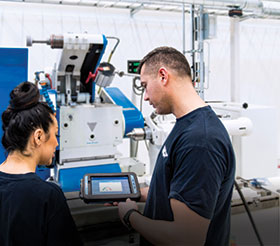

Swedish group, SKF, has been implementing digital transformation since 2015, investing close to €19 million to carry out its digital revolution at the Göteborg plant which has, for over a century, been producing the quality bearings on which the group’s success is based.
A culture of automation
Over the years the plant has witnessed developments brought about by successive waves of automation, including the introduction of the first forklifts in 1970, the implementation of lean manufacturing ten years later, and the arrival of the first industrial robots in production in 1995.
2015 saw the Göteborg facility launch the complete modernisation of its spherical roller bearing manufacturing plant. The initiative, based on a model called World Class Manufacturing, saw SKF gradually opening more sites in a bid to bring production closer to customers. The objective was to increase customer uptime and productivity by helping to reduce their stock levels and improve lead times.
However, more sites led to a significant fall in production for European plants. The global bearing and rotating technology specialist reviewed its production and adapted it to a product catalogue that is as varied as ever, but with smaller volumes to achieve the digitalisation goal, which is not to produce more but to gain in flexibility.
One new Industry 4.0 production line
Historically, the Göteborg plant ran four conventional production lines, each dedicated to the manufacture of only one type of bearing. Digitalisation resulted in the replacement of the four original lines with a new, almost completely automated Industry 4.0 production line that can deal with different sizes and selections. Three of the previous lines have already been shut down, while the life of the fourth has been extended to serve as backup and will be shut down by December, when the workshop’s digital transformation will be complete.
The digital transformation incorporates a range of solutions from robots and AGVs to sensors and tablets. There are 22 industrial robots on the new production line, which is divided into four distinct units corresponding to four production steps namely grinding, assembly, marking and lubrication. In all, 25 different software applications are used to coordinate the process. A MES collects the production data in real time in order to control activities, such as the management of the AGVs. This system is in turn coupled with new ERP software, linking production to demand to ensure the seamless running of the workshop operation, which involves some 1500 trips by the AGVs daily.
In the grinding phase, the rings are placed on pallets before being grasped by a massive six-axis robotic arm. Fitted with adaptive grippers on the wrist joint, the arm can grasp nearly 200 different types of rings. (It takes just three seconds to automatically adapt to parts with diameters of between 180 and 400 mm.) Plunged into a closed chamber, the rings come out less than a minute later, ground and polished, for placement in a pallet whose volume is monitored by three cameras. Once the pallet is full, an AGV takes it to the assembly island, after which follow the final two phases – lubrication and marking. The QuickCollect sensor, developed by SKF, ensures constant monitoring of machine operation. For convenience, operators who move between the workstations are able to take instructions directly from their tablets.
With a wide range of solutions always available to solve a particular problem, SKF did not hurry to adopt all cutting-edge technologies. Instead, the company first thoroughly assessed each technology to ensure it met a real need before the process was integrated. For example, in order to be integrated into the new grinding unit, certain machines dating back to the 1980s were retrofitted with the addition of servomotors and an IoT layer. Automation was done without interrupting production.
Digital transformation is an ongoing process at SKF, as the company continues to strive for added value through improved efficiencies, product quality and service delivery.
For more information contact Samantha Joubert, SKF South Africa, +27 11 821 3500, [email protected], www.skf.com
| Tel: | +27 11 821 3500 |
| Fax: | +27 11 821 3505 |
| Email: | [email protected] |
| www: | www.skf.co.za |
| Articles: | More information and articles about SKF South Africa |
© Technews Publishing (Pty) Ltd | All Rights Reserved